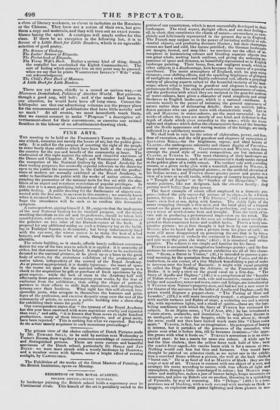FINE ARTS.
THE meeting to be held at the Freemason's Tavern on Monday, at one o'clock, concerns not merely the lovers of art, but the public gene- rally. It is called for the purpose of asserting the right of the people to enter freely those edifices which have been built at the expense of the country for the use and benefit of the community at large. The vindication of this right against the odious and shameful exactions of the Deans and Chapters of St. Paul's and Westminster Abbey, and the usurpation of the National Gallery by the Royal Academy for their trailing purposes, has avowedly especial reference to the throwing open to the public the monuments in the Cathedrals, and the produc- tions of modern art annually exhibited at the Royal Academy, in order to familiarize the public with the works of native artists—thus coupling the promotion of the national taste for fine art with the abo.
lition of an unjust and vexatious restriction of popular privileges. In this view it is a most gratifying indication of the improved state of tho public feeling. A public meeting for the furtherance of objects con- nected with the fine arts, is an event in this country ; we scarcely know when it occurred before. It has excited considerable interest, and we hope the attendance will be such us to confirm this favourable symptom. A correspondent, signing himself J. M., suggests that the inadequacy of the new National Gallery for its twofold purpose, and the injury resulting therefrom to the art and its professors, should be taken into consideration, with a view to the evil being remedied by an extension of the galleries on two sides of the Barrack-square at the back. A proposal for any additional outlay on such a trumpery toy as the build- ing in Trafalgar Square, is distasteful ; but being unfortunately fixed with the eye-sore, the wisest course is to make the best of a bad bargain, and remedy the want of room, though the meatiness is un- alterable.
The whole building, as it stands, affords barely sufficient accommo- dation for one of the two uses to which it is applied : it is unworthy of either, but that cannot now be helped. It ought either to be exclusively devoted to the national pictures, or be given up as a boon to the great body of artists, for the gratuitous exhibition of the productions of native talent, independent of the control of the Royal Academy. As at present appropriated, it is doubly injurious : the want of space in the rooms set apart for the national collection will operate as a check to the acquisition by gift or purchase of fresh specimens by the great musters : while the lack of room in the Academy half will effectually deter painters from attempting great works, by the fear of exclusion from the exhibition ; thus aiding the clique of portrait- painters in their efforts to stifle high aspirations, and abetting their
tyranny over their brethren. What right has this self.elected, irre- sponsible junta, who arrogate to themselves the honours and privi. leges of the profession, and exercise despotic sway over the rest of the community of artists, to convert a public building into a show-shop for exhibiting their wares for profit ?
Our correspondent states that " the tyranny of the Royal Academy has this year been exercised with more capricious cruelty and injustice
than ever;" and adds, " it is known that from seven to eight hundred productions, many of them interesting subjects, and of great merit, have been rejected." This is nothing but what we expected. But why do the artists tamely acquiesce in such monstrous proceedings?


























 Previous page
Previous page